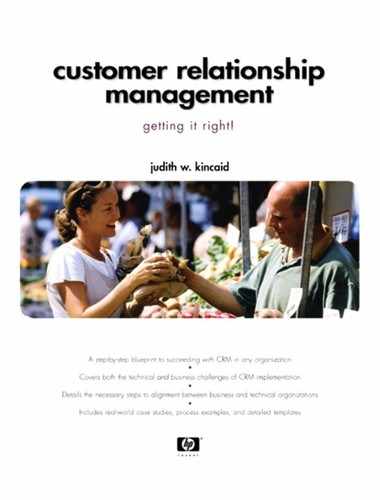Chapter 11. Understanding the Information Component
Information is the first of the four CRM infrastructure components that we're going to work on. We'll start with the information component because it is very often an orphan that gets lost somewhere between Information Technology and the business functions. Sales, marketing, customer service, and product support think that information is just the first word in Information Technology; it's somebody else's job. But the IT folks think that their job is the technology, period. Information is used to make daily business decisions but nobody is responsible for it. It's always the other guy's responsibility. That's scary.
There is an historical basis for this; it used to be that information systems were developed within vertical functional silos. The experts who understood the process were trained and focused only on their own responsibilities. Systems were developed for vertical process slices so that only the information needed for that process was considered. For example, a company in Canada might have decided that, for tax and customer reasons, it would ship only to Canadian locations. Its customer file didn't need to include a field for “country” because it was always Canada. Then the company began selling its products to customers headquartered all over North America and now sends bills to locations in the US and Mexico as well as Canada. The billing and shipping databases didn't match: information could not be moved back and forth between them. But that is exactly what we need to do for CRM—share and integrate customer information across the entire set of customer facing systems.
It is imperative that we (business and technology people) put siloed thinking behind us. Information requirements must be defined and documented in exactly the same way that processes and their supporting technologies are designed. It is the responsibility of the business team to determine what information is needed. It is the responsibility of the IT team to recommend and build the best solution for capturing, managing, storing, and sharing that information. When information is considered a byproduct that just occurs when the system is built it is considered to be disposable. In fact, just the opposite is true.
Information is the raw material from which successful CRM programs are constructed. Throughout this book, we've discussed how important customer information is. Information is the raw material of every CRM effort because, for CRM, electronic knowledge takes the place of human knowledge in building customer relationships. We must get information right!
